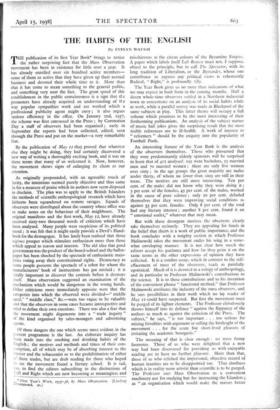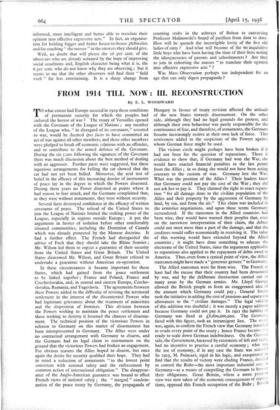THE HABITS OF THE ENGLISH
By EVELYN WAUGH
THE publication of its first Year Book* brings to notice the rather surprising fact that the Mass Observation movement has been in existence for little over a year. It has already enrolled over six hundred active members— some of them so active that they have given up their normal businesi and devoted their whole time to it. More than that it has come to mean something to the general public, and something very near the fact. The great speed of this establishment in the public consciousness is a sign that the promoters have already acquired an understanding of the way popular sympathies work and are worked which a professional publicity agent might envy ; it also argues zealous efficiency in the office. On January znd, 1937, the scheme was first canvassed in the Press ; by Coronation Day a staff of observers had been organised ; early in September the reports had been collected, edited, seen through the Press and put on the market—a very remarkable feat.
By the publication of May I2 they proved that whatever else they might be doing, they had certainly discovered a new way of writing a thoroughly exciting book, and it was on these terms that many of us welcomed it. Now, however, the movement shows signs of enlarging its claim to our attention.
As originally propounded, with an agreeable touch of levity, the intentions seemed purely objective and thus came in for a measure of praise which its authors now seem disposed to disclaim. The plan was to apply to the British Islanders the methods of scientific anthropological research which have hitherto been squandered on remote savages. Squads of observers were distributed about the country whose office was to make notes on the behaviour of their neighbours. The original manifesto and the first work, May 12, have already received sixty-two thousand words of criticism which have been analysed. Many people were suspicious of its political trend ; it was felt that it might easily provide a Devil's Hand- book for the demagogue. It has lately been realised that those regimes prosper which stimulate enthusiasm more than those which appeal to reason and interest. The old idea that good government was the product of the board-school and the ballot- paper has been shocked by the spectacle of enthusiastic majo- rities voting away their constitutional rights. Democracy to some people presents the spectacle of a robot for whom the manufacturers' book of instructions has got mislaid ; it is vitally important to discover the controls before it destroys itself. Mass observation suggested an examination of the mechanism which would be dangerous in the wrong hands. Other criticisms more immediately apposite were that the categories into which the observed were divided—" middle aged," " middle class," &c.—were too vague to be valuable and that the observers in some cases became introspective and tried to define their own emotions. There was also a fear that the movement might degenerate into a " trade inquiry " of the kind organised by sales-managers and advertising agents.
Of these dangers the one which seems most evident in the Present programme is the last. An elaborate inquiry has been made 'into the smoking and drinking habits of the English ; the motives and methods and times of their con- %umption, all of which may be of absorbing interest to the brewer and the tobacconist or to the prohibitionists of either these trades, but are drab reading for those who hoped to see the movement found a literary school. It is sad, too, to find the editors subscribing to the distinctions of I-eft and Right which are now becoming as meaningless and * First Year's Work, z937-38, by Mass Observation. (Lindsay Drummond. 2s.) mischievous as the circus colours of the Byzantine Empire. A paper which labels itself Left Review must not, I suppose, object to the principle, but to call The Spectator, with its long tradition of Liberalism, or the Bystander, whose one contributor to express any political views is vehemently Radical, " Right," is profoundly The Year Book gives us no more than indications of what we may expect in book form in the coming months. Half a dozen whole-time observers settled in a Northern industrial town to concentrate on an analysis of its social habits while at work, while a parallel survey was made at Blackpool of the same subjects at play. This latter theme will occupy a full volume which promises to be the most interesting of their forthcoming publications. An analysis of the subject matter of music hall jokes gives the surprising result that the most risible references are to ill-health. A work of interest to " reformers " should be the enquiry into the popularity of Football Pools.
An interesting feature of the Year Book is the analysis of the observers themselves. Those who presumed that they were predominantly elderly spinsters will be surprised to learn that of 412 analysed, 195 were bachelors, 55 married men and 70 married women ; there are only five women over sixty ; in the age groups the great majority are males under thirty, of whom no fewer than sixty are still in their teens. The motives are still more interesting. Ten per cent. of the males did not know why they were doing it ; 5 per cent. of the females, 45 per cent. of the males, worked in the cause of pure science ; only 20 per cent. deluded themselves that they were improving social conditions as against 33 per cent. females. Only 8 per cent. of the total had any literary interest ; another 8 per cent. found it an " emotional outlet," whatever that may mean.
But with these divergent motives . the observers clearly take themselves seriously. They are appealing for funds in the belief that theirs is a work of public importance, and the book concludes with a weighty section in which Professor Malinowski takes the movement under his wing in a some- what enveloping manner. It is not clear how much the editors accept his guidance and how far they print it on the same terms as the other expressions of opinion they have collected. It is a sombre essay, which in contrast to the self- effacement of most of the observers, reads as painfully egotistical. Much of it is devoted to a eulogy of anthropology, and in particular to Professor Malinowski's contributions to the science. It is to these contributions and to his invention of the convenient phrase " functional method," that Professor Malinowski attributes the industry of the mass observers, and he sees possibilities in their work which no lay reader of May 12 could have suspected. But first the movement must be purged of its lighter elements. The Professor chivalrously throws himself into its defence " against the flippancy of the authors as much as against the criticism of the Press. The subject," he says, " is too important . . . too serious for mixing frivolities with argument or selling the birthright of the movement . . . for the acute but short-lived pleasure of irritating the academic bourgeois."
The meaning of that is clear enough : no more funny footnotes. Those of us who were delighted that a new way had been discovered for providing us with enjoyable reading are to have no further pleasure. More than that, those of us who relished the impersonal, objective record of human inanities are to be disappointed too. That aloofness which is in reality more artistic than scientific is to be purged. The Professor sees Mass Observation as a convenient machinery not for studying but for instructing the Islanders ; as " an organisation which would make the masses better informed, more intelligent and better able to translate their opinion into effective expressive acts." In fact, an organisa- tion for holding bigger and better house-to-house plebiscites and for coaching " the masses " in the answers they should give.
Well, no doubt that will please the 26 per cent. of the observers who are already actuated by the hope of improving social conditions and, English character being what it is, the 6 per cent. who do not know why they are observing ; but it seems to me that the other observers will find their " field work " far less entertaining. It is a sharp change from counting stubs in the ashtrays of Bolton to canvassing Professor Malinowski's brand of pacifism from door to door. How will he quench the incorrigible levity of the five old ladies of sixty ? And what will become of the 6o inquisitive little boys who have been having the time of their lives noting the idiosyncrasies of parents and schoolmasters ? Are they to join in exhorting the masses " to translate their opinion into effective expressive acts " ?
Was Mass Observation perhaps too independent for an age that can only digest propaganda ?







































 Previous page
Previous page